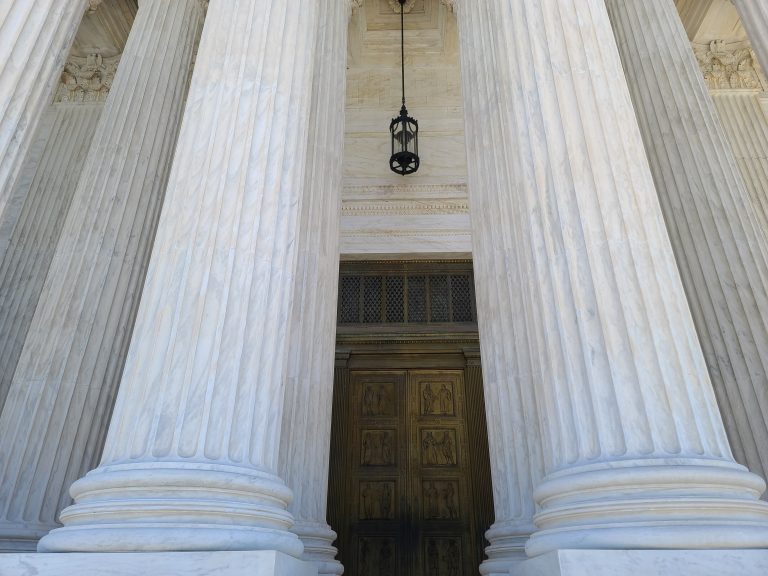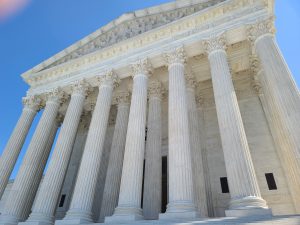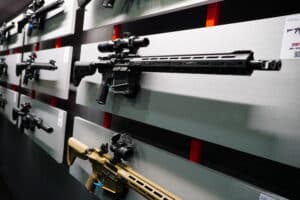The Department of Justice (DOJ) took the unusual step of asking the Supreme Court to take up a Second Amendment case in which the Federal Government is not a party.
On Thursday, the DOJ said The Court should weigh in on whether Hawaii’s ban on carrying guns in publicly accessible private property is Constitutional. It argued the prohibition violates the Second Amendment and is an affront to the 2022 landmark ruling in New York State Rifle and Pistol Association v. Bruen. DOJ said the Supreme Court should accept the case and strike down that section of the state’s gun-carry law.
“The Second Amendment, which binds the States by virtue of the Fourteenth Amendment, provides: ‘A well regulated Militia, being necessary to the security of a free State, the right of the people to keep and bear Arms, shall not be infringed,'” D. John Sauer, the current Solicitor General, wrote in Wolford v. Hawaii. “In NYSRPA v. Bruen, this Court held that the Second Amendment guarantees ordinary Americans a ‘general right to publicly carry firearms’ for lawful purposes such as self-defense. As eight judges correctly recognized in dissenting from the denial of rehearing en banc, Hawaii’s private-property default rule violates—in fact, functionally eliminates— that right.”
The move boosts the odds that the Supreme Court will take up the case, which could eliminate one of the primary responses that states with stricter gun laws have adopted in the wake of the Bruen ruling. It comes after DOJ asked The Court not to take up challenges to the gun ban for non-violent felons and other prohibited persons. The move provides further insight into the Trump Administration’s view of the Second Amendment and the legal fights surrounding it.
Sauer argued that the Court needs to get more active in issuing Second Amendment decisions to provide clarity on the contours of the rights it protects. He noted Bruen and last year’s US v. Rahimi don’t settle most of the active legal battles over gun rights. He argued that Wolford provides an opportunity to start doing that and alluded to other questions the DOJ hopes to see answered down the line.
“[G]ranting review in this case would allow this Court to provide much-needed guidance to lower courts,” Sauer wrote. “Since the foundational decisions of Heller and McDonald in 2008 and 2010, the Court has granted plenary review in and decided only two Second Amendment cases: Bruen and Rahimi. Without a developed body of precedent on which to rely, lower courts ‘have struggled’ to interpret the Second Amendment. Rahimi began the process of clarifying who may possess arms. This case affords an opportunity to begin addressing where arms may be carried. And the Court should, in an appropriate case, also provide a framework for evaluating what types of arms people may possess.”
Wolford stems from the Bruen-response law Hawaii passed after its previous gun-carry permitting law was effectively invalidated by The Court’s 2022 holding that overly selective licensing processes were unconstitutional. As part of that law, The Aloha State made it illegal for civilians, including those with carry permits, to bring a gun onto publicly-accessible private property, such as stores, unless they received express permission from the owner first. That provision, a common feature of Bruen-response laws around the country, effectively turned the way gun carry had traditionally been regulated–where it was allowed unless a property owner explicitly banned it–on its head.
Sauer argued the rule makes lawful gun carry nearly impossible in practice.
“As a practical matter, the default rule operates not just as a broad restriction but as a near-complete ban. Because most owners do not post signs either allowing or forbidding firearms, the rule effectively means that ordinary citizens may not carry firearms on any private property, even property open to the public,” he wrote. “That restriction deprives individuals who want to exercise their Second Amendment rights of their ability to ‘go about their daily lives.'”
Gun-rights advocates sued to block the law shortly after Hawaii passed it. A three-judge panel of the Ninth Circuit Court of Appeals unanimously declined to block the prohibition last September, and the full court refused to hear an appeal shortly after that. So, the plaintiffs went to the Supreme Court.
While the Federal Government is not a party to the case, Sauer argued it has an interest in clarifying and defending the Second Amendment. He also said the consequences of the case reach well beyond Hawaii itself.
“Review is especially warranted because Hawaii is just one of multiple States that have enacted such laws since Bruen. Bruen identified six outlier States that had maintained the type of may-issue licensing regime that the Court struck down,” he wrote. “Five of those States—Hawaii, California, Maryland, New Jersey, and New York—then reacted to Bruen by enacting the type of default rule at issue here.”
He said those states have “a combined population of more than 75 million—i.e., more than a fifth of the total population of the United States.”
Hawaii has defended the ban by arguing it protects the rights of property owners. However, Sauer argued the law’s targeting of firearms undermines that defense.
“Hawaii’s singling out of firearms confirms that the default rule has nothing to do with protecting property rights,” he wrote. “For everything but firearms, Hawaii presumes that owners welcome it on their property unless they affirmatively object. Individuals entering property open to the public presumptively may bring in bicycles, roller skates, protest banners, muddy shoes, dripping umbrellas, melting ice cream cones, open containers of alcohol, boomboxes, dogs, and many other things that owners might not want on their premises.”
He said the rule discriminates against individuals who exercise a constitutionally protected right and isn’t applied evenly.
“That discriminatory rule manifestly seeks to suppress gun rights, not to protect property rights. It is no more constitutional than a hypothetical law requiring political campaigners (and only campaigners) to obtain a homeowner’s express authorization before walking up the front path and knocking on the door,” Sauer wrote. “Hawaii does not explain why off-duty police officers, state employees stopping for coffee on their way to work, or out-of-state retired police officers could override property rights that everyone else must respect, or why property owners would presumptively draw the lines differently for those individuals if their objection were to having guns on their property at all. The exemptions raise ‘serious doubts about whether the government is in fact pursuing the interest it invokes, rather than disfavoring’ the exercise of a constitutional right.”
The lower court that oked Hawaii’s ban cited a number of historical laws, as required for a modern gun restriction to be upheld under Bruen. However, Sauer argued the laws that court references did not closely match the way the modern law restricts guns, nor the reason it does–two key factors in the Bruen test. He also said several of them were adopted too long after the Second Amendment to provide any insight into its meaning.
“The evidence cited by the court of appeals—four colonial laws, one mid-19th-century law, and one law enacted more than a century after the Second Amendment’s adoption—is similarly inadequate to justify Hawaii’s sweeping prohibition,” Sauer wrote. “Moreover, most of the cited laws do not go nearly as far as Hawaii’s, and so they are poor analogues. The court of appeals acknowledged that four of the six laws—the 1721 Pennsylvania law, the 1722 New Jersey law, the 1763 New York law, and the 1893 Oregon law— applied only to “subsets of private land, such as plantations or enclosed lands,’ sought ‘to prevent poaching,’ and ‘likely did not apply to property that was generally open to the public.'”
The case is still at what courts refer to as an “interlocutory” phase, which means lower courts have yet to rule on the underlying merits of the case. The Court has been wary to take up Second Amendment cases at that point since issuing its ruling in Bruen. Still, Sauer argued that shouldn’t keep the justices from considering Wolford.
“The preliminary-injunction posture in which this case arises should not deter this Court from granting review,” he wrote. “The court of appeals did not decide this case in haste; to the contrary, it issued an 81-page opinion nearly a year after petitioners appealed. The court’s decision also turned on the merits; the court explained that it “need not consider’ the equities because petitioners were not likely to succeed in challenging the default rule. And since the court’s merits analysis all but foreordains the final outcome, further proceedings in the lower courts would serve no useful purpose.”
But this isn’t the first time DOJ has asked the Supreme Court to take up a Second Amendment case and resolve lingering questions. Former President Joe Biden’s Solicitor General, Elizabeth Prelogar, made a similar request last year in several cases related to gun rights for felons.
“The substantial costs of prolonging uncertainty about the statute’s constitutionality outweigh any benefits of further percolation,” Prelogar wrote to The Court. “Under these circumstances, the better course would be to grant plenary review now.”
However, the Supreme Court declined to act. The new Solicitor General will have to wait and see if it does things any differently this time around.






